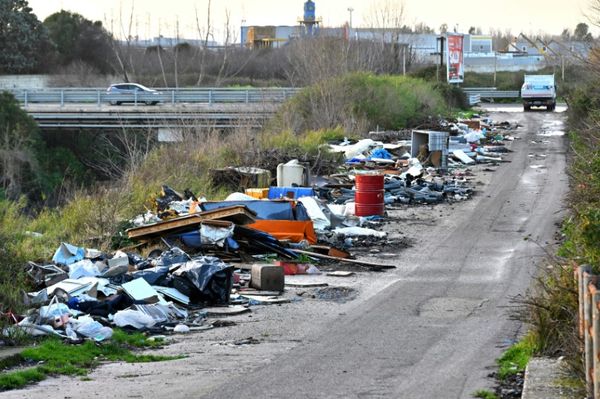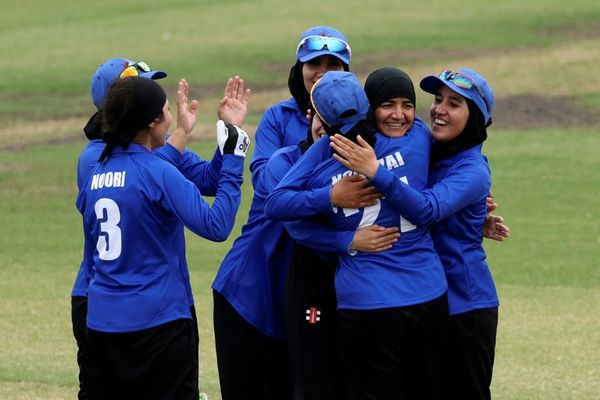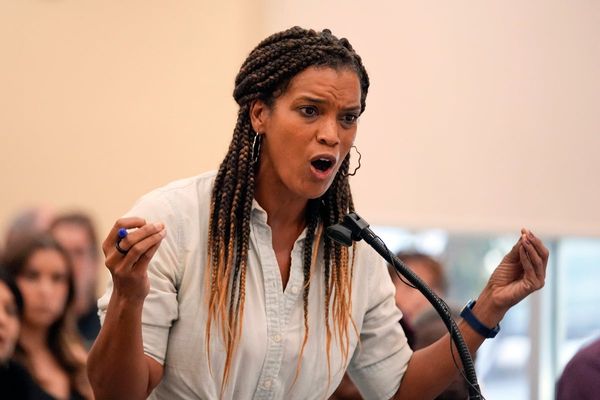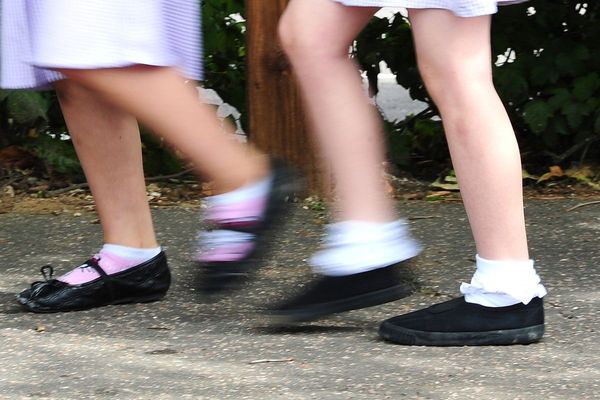
As a child growing up in Darlington, County Durham, Sophie Hird saw football as a largely masculine pursuit. “I grew up around football – it was a massive thing where I’m from, and I’d go to matches with my dad on a Saturday,” she says. “But it felt very male-dominated. You never saw women’s football on TV, and although I played a bit myself, I never saw it as a possible career.”
Things are very different today – 27-year-old Hird plays for a local women’s team, and has made a name for herself with her flamboyant fashion collections made from upcycled football jerseys.
She came up with the concept when she was undertaking a year-long internship at a global sportswear brand, as part of her degree at the London College of Fashion. During the internship, she started collecting unwanted football kit samples. However, her pieces radically break with traditional football stereotypes and were inspired by looks from bygone eras, including the 17th century and the wild west.



Sophie Hird’s sketches and designs, along with some of her finished creations.
“Even though I studied fashion design, I’ve always been really interested in costume design, and in styles from the baroque period, especially menswear,” she says. “When I was working on my final degree collection, I found a set of postcards depicting baroque characters, including one who was wearing a red and white striped leotard. I thought: ‘That looks like a [football] shirt …’ and all of a sudden I saw the connection between football jerseys and that era in fashion.
“I wanted to create a contrast between those flamboyant, delicate 17th-century styles, and modern football – the baroque characters wearing silk-striped fabrics, and the football players in striped polyester. I loved the idea of playing with putting football jerseys in a brand new context.”

Sophie Hird: ‘When I was at college I would go charity shopping, I loved it because you knew no one else would be wearing the same thing.’
The result was a collection of colourful, gender-fluid garments: panelled crop tops, tassel tracksuit bottoms, and dramatic bell-sleeved doublets, all made from upcycled football shirts. Now, three years on from her graduate show, Hird works part-time in a local cafe and sells her designs on commission (sophiehird.com), creating each piece in the living room of her flatshare in Deptford, south-east London.
“It takes a lot of hustling and perseverance to make it work, so it’s great that Visa is supporting small businesses like mine – there are so many of us out there that need this support,” she says. Visa’s tools and resources have helped countless people like Hird to begin selling their work to the world.
After Hird had worked through the sample kits she picked up at her internship, she began visiting car-boot sales to find new items to upcycle. “I became a bit obsessed with it,” she says. “I couldn’t even contemplate going fabric shopping in the same way I would have done in the past – this was much more exciting. Luckily, I live close to a big car-boot fair in Deptford, and every Saturday there’s a stall selling piles of jerseys. It’s like a goldmine, especially as I try to get all my materials secondhand.”
Although Hird didn’t set out to be a sustainable designer, her work is inherently eco-friendly – partly thanks to a longstanding interest in the eclectic looks afforded by secondhand fashion.
“When I was a teenager, before sustainable fashion was even a topic of conversation, I would go charity shopping with my mum,” she says. “When I was at college I just loved it, because you knew no one else would be wearing the same thing. You could buy clothes that were really unique, and I’ve always preferred that kind of shopping.
“At the same time, I appreciate that not everyone can afford to avoid fast fashion. I’m not trying to change the industry – it’s the big brands that have the power to do that – but there’s a community of designers, especially in London, doing similar things, and it’s nice to see our work getting recognition.”



Hird sources a lot of her materials from market stalls selling secondhand football shirts, which she then transforms into new, flamboyant designs.
As well as dressing high-profile fans from the music industry, including Declan Mehrtens of punk rock band Amyl and the Sniffers, and Sports Team’s Alex Rice, Hird has worked on some exciting collaborations, some of which are likely to coincide with UEFA Women’s Euro 2022, which England is co-hosting.
“Collaborations help keep my work fresh – it’s nice to have input from someone else, and be given a different direction,” says Hird. “One of my favourite projects to date was with UEFA, for the Women’s Champions League. The brief was to celebrate different moments through the tournament, which allowed me to create items I really wanted to make. To have that freedom with such a high-profile client was surreal, but also a bit terrifying.”
This year, she is working on a personal project with the art director Craig Stronach, celebrating the unofficial England women’s squad who competed at the 1971 women’s World Cup. “We’re making something special for the team and their coach, Harry Batt, who together paved the way for women’s football.”
It is just one of many ways in which Hird has kept finding new ways to build upon her initial idea. As a football fan herself, Hird applauds Visa’s sponsorship of the 2022 Women’s Euros and she will be cheering on the England team at the competition. “I’m going to a few of the matches with my best friend, and some of the girls from my football team have bought tickets too,” she says. “I think it’ll be great for the younger generation to see women’s football getting more exposure. There are exciting times ahead.”
When more of us play, all of us win
Competition is at its best when everyone truly has the chance to take part. That’s why Visa is a proud sponsor of UEFA Women’s EURO 2022. And Visa’s support goes beyond the pitch. Visa has committed to digitally enabling 8 million small businesses in Europe by the end of 2023, providing technology and tools to help turn small ideas into big businesses, wherever they are. To find out more about how Visa is championing access and inclusion visit: visa.co.uk/wUEFA2022







